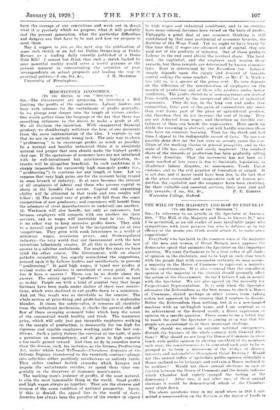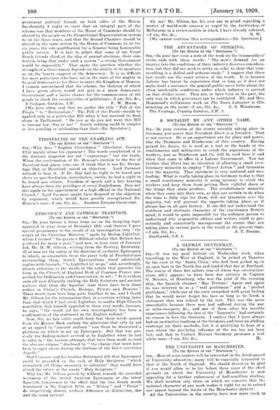THE WILL OF THE MAJORITY AND HOW TO ENSURE IT.
[To TEE EDITOR OF THE " SPECTATOR."] Sus,—In reference to an article in the Spectator of January 10th, " The Will of the Majority and How to Ensure It," may I be permitted, as an old reader of your invaluable paper who sympathizes with your purpose but who is dubious as to the efficacy of the means you think would attain it, to make some suggestions?
Everybody who has faith in the common-sense of the majority of the men and women of Great Britain must approve the democratic spirit that animates the Spectator on this important question. We want Parliament to he a true reflex of all shades of opinion in the electorate, and to he kept in such close touch .with the people that with reasonable certainty we may assure a majority in the House of Commons to represent a majority in the constituencies. It is also essential that the considered opinion of the majority of the electors should promptly affect the action of the Government. So far I believe I am in accord with the Spectator. We are also agreed on the necessity for Proportional Representation. It is only when the Spectator advocates the Referendum as the best means to check a House of Commons, elected perhaps on other issues, from taking action not approved by the country that I venture to dissent. Better the Referendum than nothing, but it is a new-fangled machine with an un-English name, and I am sceptical as to its achievement of the desired result, a direct expression of opinion on a specific question. There seems to me a better way to reach the goal the Spectator is aiming at—a way that the people are accustomed to in their municipal elections. Why should we, except in extreme national emergencies, disturb the business of the whole country with General Elec- tions ? Why should we not keep the House of Commons in close touch with public opinion by electing one-third of its members each year, the constituencies to be contested each year to be so grouped as to form a microcosm of the wishes of diverse interests and nationalities throughout Great Britain ? Would not this annual influx of up-to-date public opinion stimulate a House inclined to be lethargic and restrain a House inclined to he reckless ? Would not these annual elections in case of friction between the House of Commons and the Senate indicate which Chamber had rightly -gauged the feeling of the
democracy ? After two, if not after one, of these annual elections it would he demonstrated which of the Chambers must climb down.
The above questions were in my mind when in 1910 I sub- mitted a memorandum on the Reform of the House of Lords to
prominent political friends on both sides of the House. Incidentally I ought to state that an integral part of the scheme was that members of the House of Commons should be elected by the people on the Proportional Representation system to sit for three years, and that the Second Chamber should he elected on the same system by the House of Commons to sit for six years, the sole qualification for a Senator being honourable public service. It is fair to admit that some of my Front Bench friends shied at the idea of annual-elections, their con- tention being that under such a system "a strong Government would be impossible." That opens the question whether the Et rength of a Government depends on the ability of its members or on the hearty support of the democracy. It is as difficult for most politicians who have sat in the seats of the mighty to be good democrats as for Dives to enter the Kingdom of Heaven. I remain unconvinced that the scheme, the skeleton of which I have given above, would not give us a more democratic Government and a fairer chance for the common-sense of the people to check the eccentricities of politicians.—I am, Sir, &c.,
[We have often said that we prefer the title " Poll of the People " to " Referendum." The Poll of the People should be applied only to a particular Bill when it has received its final shape in Parliament. " Do you or do you not want this Bill to become law—Yes or no? " Surely nothing could be simpler of less puzzling or misleading than that.—En. Spectator.]



































 Previous page
Previous page